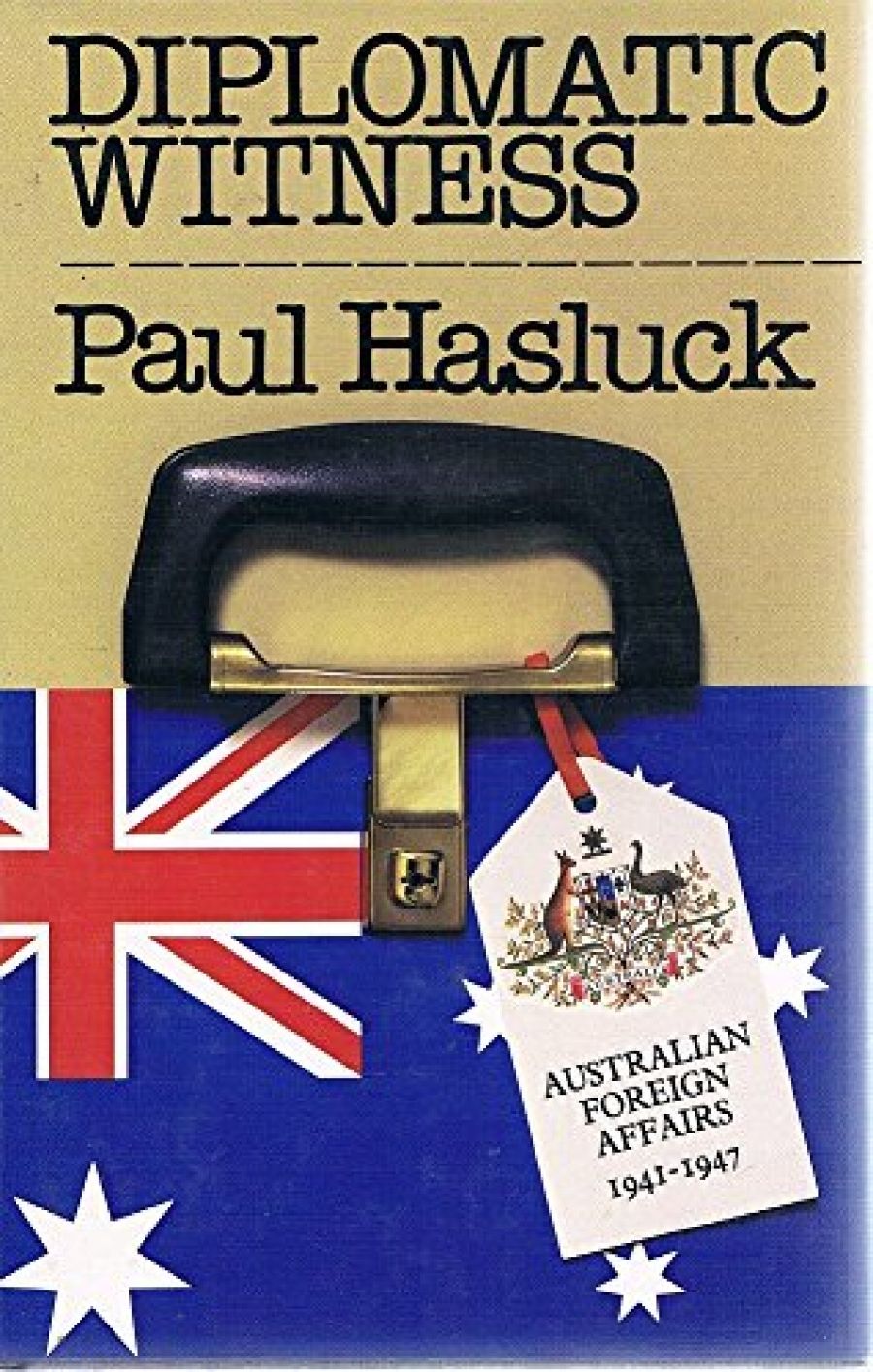
- Free Article: No
- Contents Category: Politics
- Review Article: Yes
- Article Title: Innocents barracking abroad
- Online Only: No
- Custom Highlight Text:
Sir Paul Hasluck has written a most interesting account of Australia’s foreign policy during the war and the period 1945 to 1947. His impressionistic narrative which seeks to illuminate a period of history through one pair of eyes, as a central witness, giving evidence of how it was, works quite well despite the difficulties and unintentional distortions of the historical record that such an approach can often involve. I suspect that in the fullness of time his account of this period will be substantially upheld by future professional historians.
- Book 1 Title: Diplomatic Witness
- Book 1 Subtitle: Australian foreign affairs 1941-1947
- Book 1 Biblio: Melbourne University Press, 306 pp, $25.00 pb
Clearly he is an important and reliable witness who was in a unique position to observe the drama from very close range. His wide-ranging experiences covered a succession of posts such as the Head of the Post-War Section, Director of PostHostilities Planning, right down to his role as an advisor on the Australian delegation to the San Francisco Conference. Finally, in the period covered by this book, he was delegate to the United Nations Executive Council in London and periodic delegate to the first United Nations General Assembly.
The book sheds light into several dark places; his description of Australia’s wartime administration is both useful and illuminating. This section of his eyewitness account does indeed reveal something of the nature and extent of the relationship between minister and public servants in the formulation of policy and their execution. Obviously the decisiontaker is not always the decision-maker and, in this context, the role, personality and influence of H.V. Evatt becomes central to Hasluck’s highly readable account.
I found Evatt to be the core of Hasluck’s book, and though his personality emerges through these pages, there remains a certain lack of perspective in the narration which still puzzles me. Perhaps Hasluck knew Evatt too well; the former always remained cool and in command but Evatt was frequently flustered, frantic and disordered. Such different men were bound to remain basically incompatible and distant. But remarkably enough they were able to work closely together. Hasluck never however became an ‘Evatt man’ in the department of External Affairs and yet was never simply a ‘departmental man’ either. S. Paul describes Evatt as possessing some great intellectual gifts with a mind that was analytical rather than innovative. This suggests that Evatt had a considerable intellectual weakness when seeking to reflect or seek out a deeper philosophical argument in support of his policies. Indeed, as Hasluck observes ‘I seldom heard Evatt show any interest in ideas or principles in the broad’. Rather Evatt was better at spotting a weakness in an argument than making a powerful argument based on something more than intuitive wisdom.
Evatt’s thinking, according to Sir Paul, was superficial and derivative, although not exactly shallow, but unrelated to the policy objectives which he pursued in the light of his professed aims, all of which were very general in character. He believed in world peace, the welfare of the common man, etc., but gave expression to these broad ideological objectives in an imprecise and muddled way in relation to his pursuit of the national interest.
Evatt did not really understand international politics; indeed, I think that very few Australian politicians ever do. But be that as it may, Evatt felt out of his depth in relation to international affairs; his dislike of Professor Sir Charles Webster, the historian, whom he met periodically at international conferences, merely reflected his own unease with his ignorance of modern European history. As Hasluck observes, Evatt ‘was greatly handicapped by not recognizing some of the differences between international politics and domestic politics. Evatt had a ‘football barracker’s type of patriotism’ as Hasluck says, and felt strongly that an Australian’s voice should always be heard even if it had nothing to say!
But this book contains more than a critique of Evatt; it is truly a succinct contribution to the debate about the relationship between Cabinet ministers and public servants in the Australian system. Sir Paul Hasluck was an outstanding civil servant and Cabinet Minister with a bent for analysis, good judgment, and historical insight. This book adds to his reputation.


Comments powered by CComment